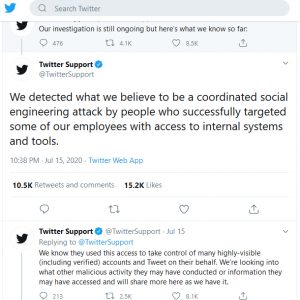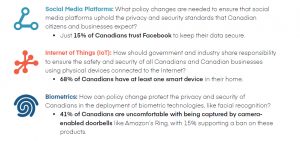Three of the most popular and high-impact technologies we use today are among the most threatening to our collective cybersecurity and digital privacy.
Those are among the findings of a new cybersecurity initiative unveiled in Canada, Cybersecure Policy Exchange (CPX).
Social media platforms, the Internet of Things and biometric (i.e., facial) recognition technologies are having a huge impact on our social, political and economic structures already, and so they will be the “immediate focus” of the CPX agenda, which advances the proposition that “[c]ybersecurity and digital privacy are not just technical matters that should only concern experts. They must be matters of vital importance to all Canadians.”
The Cybersecure Policy Exchange is a new initiative from Ryerson University, dedicated to advancing effective and innovative public policy in cybersecurity and digital privacy. The Cybersecure Policy Exchange is powered by RBC through Rogers Cybersecure Catalyst and the Ryerson Leadership Lab.
At an event held yesterday, Tuesday, July 14, members of the CPX team from RBC,
Rogers Cybersecure Catalyst and Ryerson Leadership held a live online event to describe their initiative, report on a recent survey they’ve commissioned, and to elaborate on the current cybersecurity threat landscape.
Even as the event was being held, that landscape was changing dramatically and threateningly:

Twitter tweeted about the Twitter attack as it happened.
Social media giant Twitter was facing one of its most serious threats ever – a “coordinated social engineering attack” that left some of its highest-profile user accounts severely compromised: Apple, former U.S. president Barack Obama, Tesla and SpaceX CEO Elon Musk, presidential candidate Joe Biden, Amazon founder and CEO Jeff Bezos, Microsoft co-founder Bill Gates, Uber, and businessman and politician Mike Bloomberg, among others. Several small bitcoin operations were also targetted.
Meanwhile, this country’s security agency was among those international organizations describing a series of recent cyberattacks directed at Canadian, United Kingdom, and United States organizations involved in COVID-19 response and recovery efforts, including vaccine research centres.
So the headlines helped fuel the cybersecurity presentation, as Charles Finlay, Executive Director of Rogers Cybersecure Catalyst, has noted: “We live and work in a time of unprecedented technological development and adoption — further accelerated by events like COVID-19. We need urgent national policies that protect our security and digital privacy while ensuring equal access for all.”
The concern is also accelerated during the coronavirus pandemic, as we all adopt new online technologies to stay connected and engaged making us more vulnerable to privacy and security risks.
Finlay wants the initiative to be a platform for debating and advancing cybersecurity policy by engaging with the general public, industry, government, academia, and civic institutions.

An excerpt from the report from the Cybersecure Policy Exchange (CPX) revealed that 57 percent of Canadians say that they have been a victim of a cybercrime. Advancing a Cybersecure Canada: Introducing the Cybersecure Policy Exchange. Finlay, C., Bardeesy, K. & Su, Y. (2020, July 9). Retrieved from: https://www.cybersecurepolicy.ca/agenda
Nevertheless, CPX does have its eyes set on specific threats and opportunities presented by three high-impact technologies: Social Media Platforms, the Internet of Things (IoT), and Biometrics and Facial Recognition, and so the initiative will put forward public policy research, approaches and recommendations in those three areas within the next 12 months.
As explained in a newly released report from the group, called Advancing a Cybersecure Canada, most laws in the country were introduced before tech disruption, they do not properly address cybersecurity and digital privacy risks to ensure public trust and security.
CPX maintains that there is an urgent need to address the security and privacy risks and vulnerabilities facing Canadians online.
“To do so, our governments, our public and private institutions, and all Canadians must demonstrate leadership, to ensure that we create and implement balanced public policy that will drive innovation while responsibly protecting Canadians,” stated the report’s authors.
Among the main points contained in the CPX report and described during the event:
○ 57 percent of Canadians reported being the victim of a cybercrime
○ 31 percent unintentionally installed or downloaded a computer virus or malware
○ 28 percent experienced a data breach that exposed personal information
○ 22 percent had an online account hacked
○ 13 percent have been a victim of phishing
○ 8 percent have unintentionally installed or downloaded ransomware
Only 26 percent of Canadians with a smart speaker or voice-operated assistant have restricted the information it can access through its settings, according to the report and findings collected during a mid-May survey.
(The anonymous survey was conducted online by Pollara Strategic Insights on behalf of the Cybersecure Policy Exchange with 2,000 Canadian residents 18 years of age or older, from May 14 to 22, 2020.)
“Cybersecurity has quickly become one of the most important issues of our time,” said Laurie Pezzente, Senior Vice-President of Global Cyber Security and Chief Security Officer at RBC. “As a leading organization in cybersecurity entrusted to keep our clients’ data safe and secure, RBC is proud to support the Cybersecure Policy Exchange and its ambitious policy agenda. Questions of privacy and security are paramount for all Canadians and policymakers, and proper governance of these issues will ultimately contribute to a more prosperous and equitable world.”
# # #

We need urgent national policies that protect our security and digital privacy while ensuring equal access for all, says a new cybersecurity report.
– 30 –



